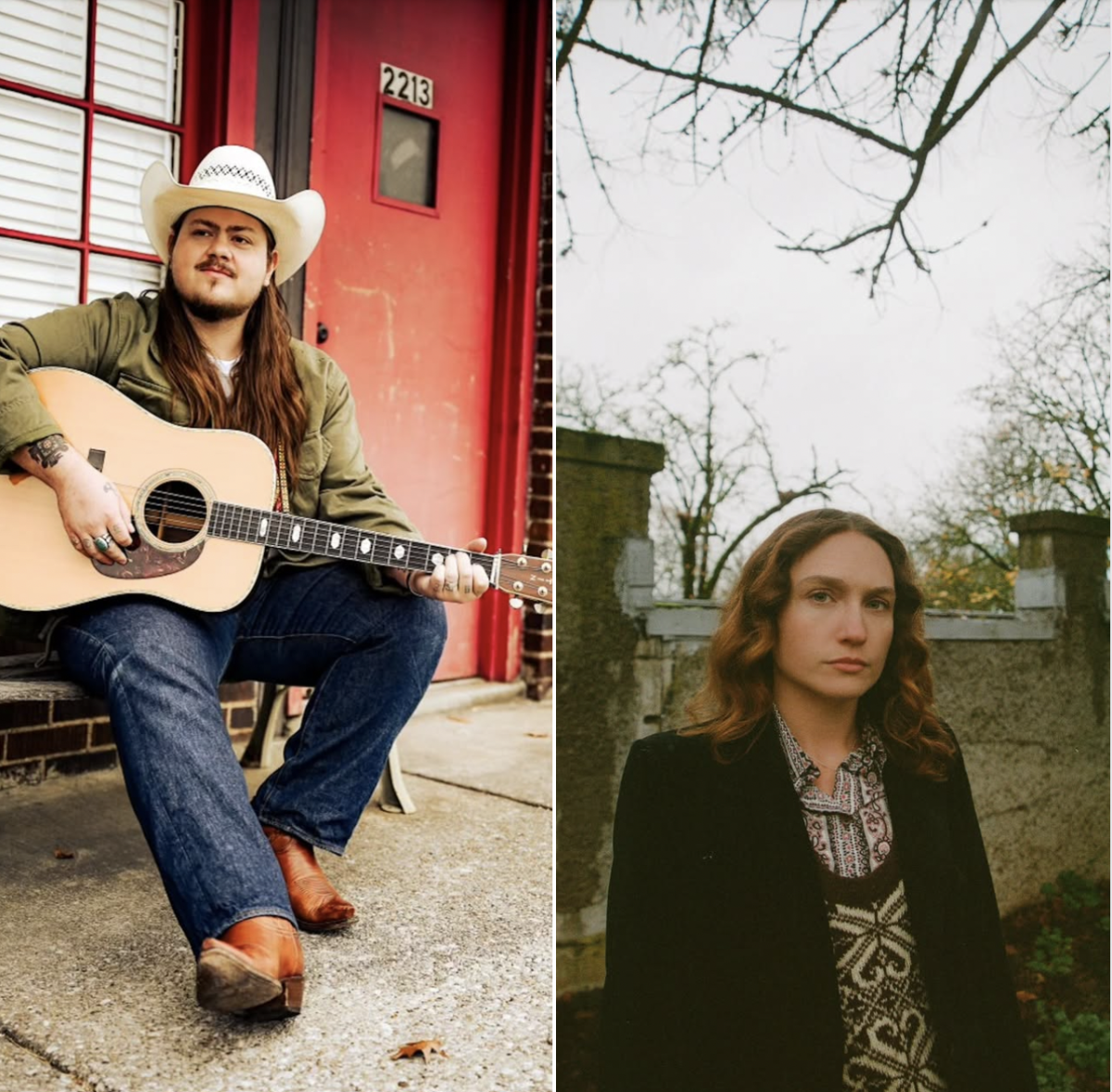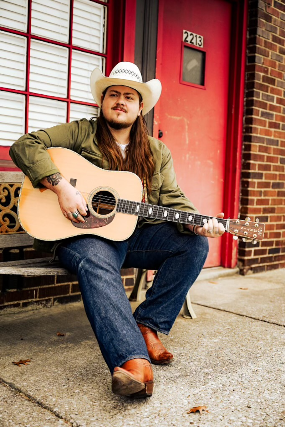
Raised in Van Zandt County in East Texas by a single mother of Choctaw-Apache descent, Emerson's world changed when he first heard Townes Van Zandt's music. "To hear a guy from Fort Worth say those kinds of things and make those songs was pretty eye opening," the now 29-year-old songwriter says. "I had never heard songwriting like that before." He's spent the better part of the past decade honing his songwriting and performance chops playing bars, honky-tonks, and BBQs joint across the Fort Worth area. His first album Fried Chicken and Evil Women, which he wrote in his mid-twenties and came out on La Honda Records, the label he cofounded that now includes a roster of Colter Wall, Local Honeys, and Riddy Arman, is a snapshot of his growth as a songwriter and stage-tested charm with songs like "Willie Nelson's Wall" and "25 and Wastin' Time" expertly combining humor and tragedy.
These marathon gigs and the undeniable songs on his debut introduced Emerson to Canadian songwriter Colter Wall, who quickly became a close friend and took him on tour. With Wall's audience and sold-out theater shows on runs with Charley Crockett, Turnpike Troubadours, and many others, Emerson found his niche. "It took a guy from Canada bringing me on tour for people to actually start paying attention," says Emerson. "Before that it was a grind like anything else just trying to make a living." Crockett is another staunch early supporter of Emerson's and covered Fried Chicken highlight "7 Come 11" on his 2019 LP The Valley.
Like every working musician, 2020 pulled the rug out from under Emerson. With the pandemic shuttering live music and cancelling promising tours, he processed the upheaval the only way he knew how: by writing his ass off. "At the beginning of quarantine, I was really frustrated with everything else going on," says Emerson. "Everything was falling apart around me, and I didn't know what to do." He took to his writing shed and came up with the single "High On Getting By," a gorgeous song full of self-reflection and resilience: the most autobiographical thing he's ever written. He sings, "I got my first child on the way / And the bills are all unpaid / I should have finished high school / Got a job and learned to save / But the words keep on fallin' / And the highway keeps on callin' / To my pen."
That song proved to be a turning point for Emerson. "After I wrote it, the floodgates opened up for me in my songwriting and emotionally," he says. "Songwriting has always been a therapeutic thing for me. So, I just started writing more from the heart." Allowing himself to be open and reveal some of the most intimate details of his life was a scary yet freeing prospect for Emerson, especially on the raw and devastating "Learnin' To Drown," which addresses his father's suicide. "I've been trying to write a song about my father's passing for a while," he says. "I was just having a hard time processing that emotionally. Before I was always trying to find a way to kind of dance around it and not really give too much away. But there's no beating around the bush here." He sings, "Well there ain't much that lasts too long / All the rights that I took wrong / All the lefts that still ain't gone / They will be here / Here in my sad bastard song."
Elsewhere, on "The Ballad of the Choctaw-Apache," he sings of how in the 1960s the Choctaw-Apache tribe of Sabine Parish was forced to sell "180,000 acres of ancestral land" to the government, uprooting them from their home. Emerson pulls no punches in his narration of the historic injustice, channeling the essence of traditional folk songs. He sings, "Well you take away their home / And you claim what you don't own/ Well I guess it's just the American way." Emerson explains the track: "This happened not too long ago and it affected my grandparents and my family directly. I've always strayed away from trying to write political songs, but this is more about human rights. For those people who were stripped of their land like that, it's still tough."
His intense and productive writing sessions produced 10 finished songs over the course of just a couple of months, a body of work so personal that he knew he would have to name the final product Vincent Neil Emerson. These demos caught the attention of Texas country icon Rodney Crowell, who signed on to produce and record the LP. "Rodney is a hero of mine," says Emerson. "He wanted to make something that serves the songs, as opposed to making a record trying to put focus on production or the playing. It was an honor to work with him." Crowell had similar high praise for Emerson: "If he grows on the public the way he's grown on me, it's possible young Vincent will plant the flag of his [songwriting] forebears firmly in the consciousness of a whole new generation." At the studio, Emerson tracked the songs with a crack team of session players. "Because of them, we were able to get those songs in one take," he says.
You can hear that no-frills approach on the barnstorming "High on the Mountain," a bluegrass tune that highlights Emerson's versatility as a performer and depth as a lyricist. On first listen, the track opens with upbeat fiddles and blistering guitar feels, but Emerson's voice achingly sings of heartbreak, loss, and irrevocable change: "I pulled into Austin / 'Cause Fort Worth ain't the same." Opener "Texas Moon" grapples with home after so many days away on tour: "I been missin' home / But I just can't ever stay / Well it don't feel like ramblin' / 'Til ya take it day by day." Emerson is never overly sentimental and across this album, he makes a point to just say how he feels in the most straightforward and real way he can.
"I think I've always gravitated towards artists that are honest about what they're doing." says Emerson. "It's the most important thing because people have a chance to connect to a little more if you're telling the truth."
"Sometimes it takes four or five tries to realize something just isn't working," says Kassi Valazza. "I wrote this after my thirteenth try." She's referring to the song "Roll On" specifically, but the stagnating pull of repeating patterns — and the brutalizing work of breaking them — inform every song on her new album From Newman Street. "In songwriting and in life, you can't keep expecting the same thing to work every time."
Valazza grew up between Prescott and Phoenix, Arizona. She penned her first song at age ten but in those early efforts to perform, found herself halted by stage fright of a clinical level. "I've gone to therapy for it," she says, half-laughing. She didn't stop writing music but she let less paralyzing means of expression lead the way, eventually enrolling in arts school for painting, an illustrative instinct that inevitably reveals itself in her vivid songwriting. It wasn't until she relocated to the Pacific Northwest as an adult that Valazza picked back up the proverbial — and actual — guitar.
"Zach Bryson was kind of like the honky tonk ambassador of Portland when I got there," Valazza says. "He was so welcoming and encouraging." She discovered an inspiring, supportive artistic community, a less rigid relationship with musical output, and then — vocal nodules. "It was actually kind of the best thing that could have happened, because I learned about the crossover of physical and mental that takes place in performance." Recovery entailed recognizing the reflexive functions of the voice in response to anxiety; as is the case throughout the human body, stress reactions can be damaging. "Because I suddenly understood what was happening with my voice, I could handle it, wield it. I felt more confident." Valazza recorded an album with Bryson in an old-house-turned-studio. It was an informal, friendly endeavor, though not at all small. "I think probably thirty people contributed," she says. "I listen back to that album and I think 'this was me learning how to do this.' I can hear that moment in time."
Valazza's debut Dear Dead Days fused the Southwest's rustic romance with the Pacific Northwest's rocky realism and garnered Valazza a cult following. She landed a deal with Fluff & Gravy, a label known for launching earthy, emerging treasures like Anna Tivel and Margo Cilker, and toured with folk favorites including Melissa Carper and Riddy Arman. Her sophomore album Kassi Valazza Knows Nothing followed, a glimmering set of sonic talismans among Ann Powers' Favorite Songs of 2023 for NPR and Bandcamp's Best Country Music of 2023, with praise from KEXP, Uncut, MOJO, and Brooklyn Vegan to boot.
By the time Valazza was ready to record her third album, she had spent a decade in Portland — and that, she realized, was enough. "As someone with anxiety, I always want to know what's going to happen," she says. "But knowing can be limiting. Getting comfortable with the uncomfortable, that's growth. That's what this album's about, really."
On "Weight of the Wheel," a weepy slide guitar underscores Valazza's listless lament: All things look the same / From the pillow on my bed / I'm stressed out I'm far away / There's dizzy dancing in my head. The song sounds like urgency, grief, surrender, and embrace — all at once. It's feeling like some kind of fight to outgrow / The way I fear slowing down before I'm old. By 2022, that dizzy demise of cyclical living had set Valazza still — in a basement apartment there in Portland. "You're going to be a different person after every album," she says. "And you have to keep moving forward."
Sights set on Nashville, Valazza landed in New Orleans. "It wasn't the plan. I spent three months there between tours, and it just kind of happened." The bright newness of The Big Easy illuminated fresh inspirations and unexpected love. But it also cast a stark light on Valazza's sense of self; in a new place, you can see more clearly what you want to be, as well as what you haven't been. "I discovered the less likeable parts of myself in that time," Valazza says. Album standout "Your Heart's a Tin Box" encapsulates precisely this, with a cynical-yet-sunny likeness to Joni Mitchell and lyrical acuity: I moved down to New Orleans / Thinking love would reappear / But people tell you everything / but what you wanna hear / You relied on fixated company / Now you're drowning in your ego's gluttony. The patterns of her Portland life had stalled Valazza. It wasn't the city's fault so much as the natural consequence of complacency, the stagnance that comes with too much of the same. Valazza knew she was due for a personal evolution, and when faced with those innate, bristling pangs of change, could soothe herself with that certainty.
The track sequence on From Newman Street is audibly intentional — from a deep lull and dull itch, to a barbed clash with cognitive dissonance, to humble submission, and an ultimate, open-armed acceptance of new life. Poetically enough, half the songs on the upcoming album were written in Portland, the other half in New Orleans. Valazza returned to her former hometown to record with Matt Thomson at Echo Echo Studios, and titled the release From Newman Street in tribute to an apartment she lived in deeply and left with heavy heart. The album is as much a fond farewell as it is a fervent step forward.
Valazza made the official move to New Orleans in February of 2024. "Coming from placid, wintry Portland straight into Mardi Gras — I would not recommend it." She recalls the time with humor, grace, and sensitivity for her past self, qualities that shine through the album. "I've always been a believer that music is only good if it's really raw, really honest — probably coming from a place of hurt," Valazza admits. "But I'm trying to embrace chaos these days, and bring a little more light into my life."


